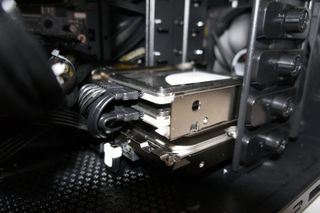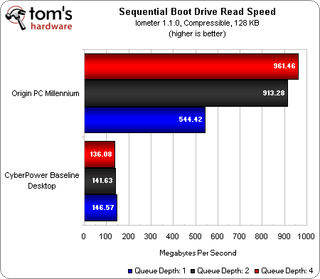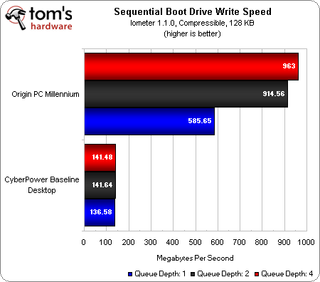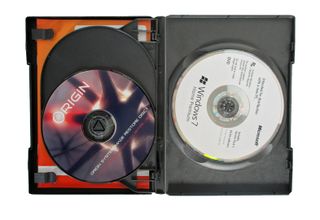Origin PC Millennium: 3-Way SLI And A 4.6 GHz Core i5
After a long hiatus, Tom's Hardware returns to consumer desktop reviews with Origin PC's Millennium. Can three GeForce GTX 660 Ti cards and an overclocked Core i5 handle gaming at 5760x1080? We want to know if this elegant box is worth its $3,000+ price.
Benchmark Results: Drive Speed

With SSD prices falling dramatically over the last several months, it's not surprising that we've seen solid-state storage appear far more frequently in mobility and performance-oriented systems. In this climate, it's not even that unusual to see a two SSDs paired together in performance desktops.
In our Millennium review unit, Origin decided to pair up two of Intel's top-end SSD 520 drives in a RAID 0 configuration for increased speed. As we said earlier, this increases the likelihood of drive failure, since a problem with one drive effectively destroys your boot partition. But when it comes to raw performance, the dual-SSD RAID 0 setup soars past the 7,200 RPM hard drive in CyberPower's LAN Party Evo.


As we expected, the Millennium's two SSDs far outperform the CyberPower system's single hard drive across the board. The general makeup of solid-state storage, combined with the fact that the Origin system has two writable drives, means that drive speed actually goes up along with queue depth. With more files being read or written at once, both read and write speeds approach 1GB/s at a queue depth of four. Meanwhile, the CyberPower drive's performance, limited by its mechanical actuator arm, sees a slight drop in performance as queue depth increases.
If the Millennium was stocked solely with a pair of 120 GB SSDs in RAID 0, we'd probably be knocking it for cramped storage space and the increased danger of drive failure. But Origin smartly pairs fast SSDs with a 1 TB mechanical drive. This gives you extra space for media and programs that aren't as performance-sensitive. There's also plenty of room for backing up an image of the system's boot drive, which we'd strongly suggest you do regularly, given the increased risk of failure inherent to any striped setup.

Origin includes a pair of DVDs that hold the stock drive image, along with a Windows disk. While these discs can get you back up and running in a pinch, they can't replace all the programs and files that you've accumulated since purchasing the system. With this configuration of the Millennium, Origin does a good job of providing the tools to keep all that data safe, but the burden of actually backing up on a regular basis is still on the buyer.
Stay On the Cutting Edge: Get the Tom's Hardware Newsletter
Join the experts who read Tom's Hardware for the inside track on enthusiast PC tech news — and have for over 25 years. We'll send breaking news and in-depth reviews of CPUs, GPUs, AI, maker hardware and more straight to your inbox.
Current page: Benchmark Results: Drive Speed
Prev Page Benchmark Results: Power Usage And Noise Next Page Origin PC Millenium Versus Doing It YourselfAfter a rough start with the Mattel Aquarius as a child, Matt built his first PC in the late 1990s and ventured into mild PC modding in the early 2000s. He’s spent the last 15 years covering emerging technology for Smithsonian, Popular Science, and Consumer Reports, while testing components and PCs for Computer Shopper, PCMag and Digital Trends.
-
DarkSable So... no mention of the fact that you're paying for a lot of things you don't need? In it's head-to-head against the DIY rig, I'm noticing a LOT of parts that I wouldn't even consider spending extra money on.Reply
And they're getting those parts at a discount, so you're paying a lot of money for that tech line. -
EzioAs "This system’s starting price is a relatively modest $1,225. For that, you get a Core i3-2120 CPU, an AMD Radeon HD 7750 graphics card, and a 500 GB hard drive."Reply
Wow, talk about rip off... -
DarkSable Reply9539987 said:"This system’s starting price is a relatively modest $1,225. For that, you get a Core i3-2120 CPU, an AMD Radeon HD 7750 graphics card, and a 500 GB hard drive."
Wow, talk about rip off...
Haha, yeah. That's about what I spent for an i5-3570k and GTX 670. I'll stick with my hand-builts and NOT pay $700 for a tech support who reads from a script. -
mayankleoboy1 For this much price, i would add another $100 and get the i7-3770k. Those extra 4 cores will come in handy in apps.Reply
And probably get 2xHD7950. 2 card setups are easier to maintain than 3 card setups (drivers). And the compute capability of GCN is already legendry. -
Caspase mayankleoboy1For this much price, i would add another $100 and get the i7-3770k. Those extra 4 cores will come in handy in apps.And probably get 2xHD7950. 2 card setups are easier to maintain than 3 card setups (drivers). And the compute capability of GCN is already legendry.Reply
Those extra 4 threads. And I bet at stock it would lose.
Why aren't temperatures shown? I was curious to see how an ivy @ 4.6 in a mid tower with 3 GPUs with modest cooling would fair...
Most Popular




